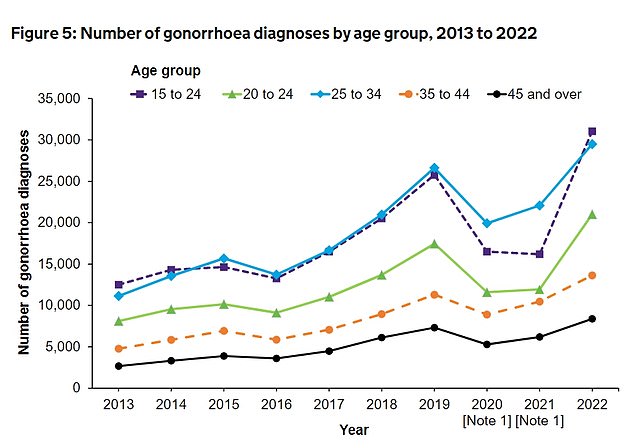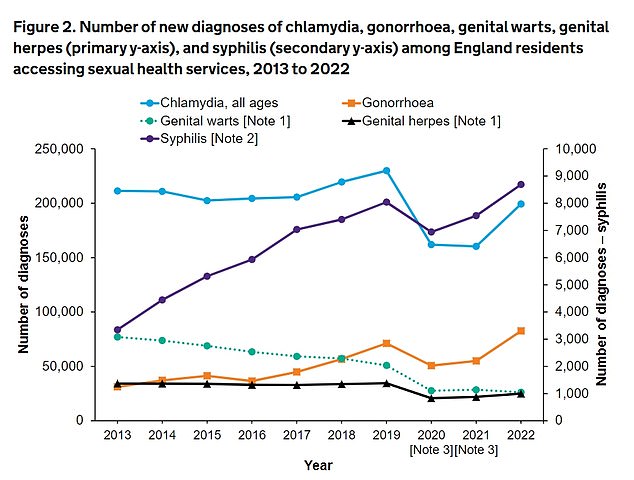England set to be first country to offer gonorrhoea vaccine after cases spiral to record high
- GThe number of cases of onorrhea has increased by 50 percent in the past year to a record high
- According to the JCVI, research shows that the shot is 32.7 to 42 percent effective
England will be the first country in the world to introduce a vaccine that could reduce the risk of gonorrhea after cases hit a record high.
The Joint Committee on Vaccination and Immunization (JCVI) has recommended that the government deliver a vaccination program that targets those most at risk.
This would use the MenB vaccine, which is used to protect children against meningitis and blood poisoning, but can also prevent sexually transmitted infections.
Cases of gonorrhea have increased by 50 percent in the past year, with 82,592 people diagnosed in 2022 – the highest number since records began in 1918.
The JCVI said research shows the jab is 32.7 to 42 per cent effective against gonorrhea, meaning it can ‘prevent many cases’ and is cost-effective.
The Joint Committee on Vaccination and Immunization (JCVI) has recommended that the government deliver a vaccination program that targets those most at risk. It would use the MenB vaccine, which is used to protect children against meningitis and blood poisoning, but can also prevent the sexually transmitted infection.

The latest UKHSA data shows that Britons aged 15 to 24 are generally the most likely to test positive for an STD. Gonorrhea diagnoses are shown here, broken down by age group

UKHSA data shows that STDs chlamydia, gonorrhea and syphilis are experiencing a huge increase following the Covid-19 boom, with diagnoses rising sharply in 2022. Syphilis diagnoses (purple line) have a separate Y-axis on the right compared to other STDs
It wants the vaccine to be offered to gay men, mainly through sexual health services.
The experts also today recommended that this group receive routine vaccinations against MPox – previously known as monkeypox.
Professor Andrew Pollard, chairman of the JCVI, said: ‘Introducing a MenB vaccination program to prevent gonorrhea in England would be a world first and should contribute significantly to reducing gonorrhea levels, which are currently at record highs.
‘In addition, we recommend setting up a routine targeted mpox offering – to prevent a recurrence of the major outbreak we saw in early 2022.
‘Both vaccinations should be offered to people at highest risk.’
The advice will now be considered by ministers at the Department of Health and Social Care before policy decisions are made on new programmes.
Should the advice be accepted, operational details on how the vaccine will be delivered will follow.
Katy Sinka, head of sexually transmitted infections at the UK Health Security Agency, said: ‘A vaccination program that impacts cases of gonorrhea would be a very welcome intervention to ensure we are better prepared to deal with this growing threat.
‘Last year we saw a rapid increase with more cases than ever before and with gonorrhea becoming increasingly resistant to antibiotics, tackling this infection is a serious concern.
‘And while MPOX case numbers remain very low across England, we should not be complacent.
‘Any routine vaccination offer to people at highest risk of infection will ensure we keep the disease under control and prevent major future outbreaks.’
